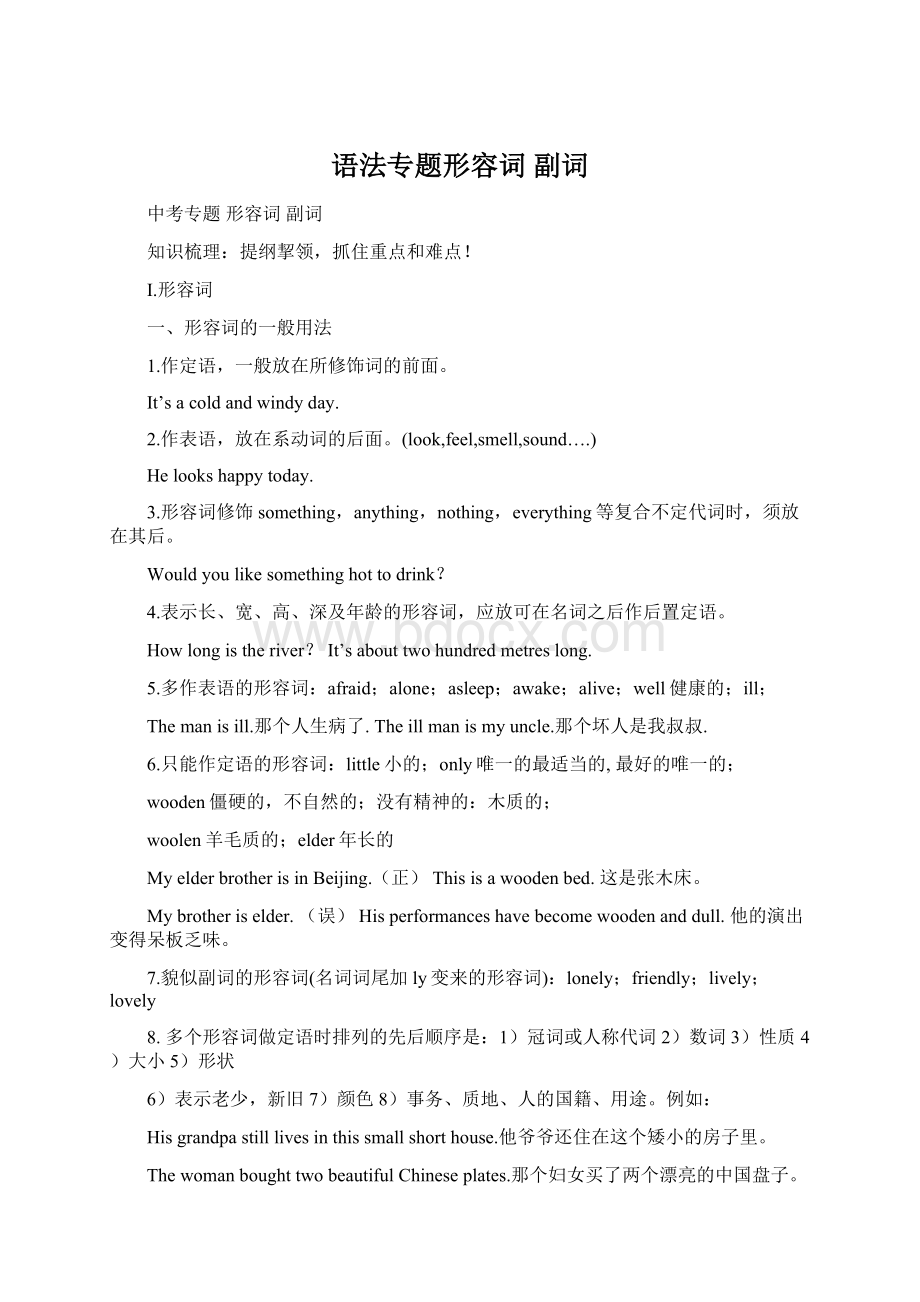语法专题形容词 副词.docx
《语法专题形容词 副词.docx》由会员分享,可在线阅读,更多相关《语法专题形容词 副词.docx(17页珍藏版)》请在冰豆网上搜索。

语法专题形容词副词
中考专题形容词副词
知识梳理:
提纲挈领,抓住重点和难点!
I.形容词
一、形容词的一般用法
1.作定语,一般放在所修饰词的前面。
It’sacoldandwindyday.
2.作表语,放在系动词的后面。
(look,feel,smell,sound….)
Helookshappytoday.
3.形容词修饰something,anything,nothing,everything等复合不定代词时,须放在其后。
Wouldyoulikesomethinghottodrink?
4.表示长、宽、高、深及年龄的形容词,应放可在名词之后作后置定语。
Howlongistheriver?
It’sabouttwohundredmetreslong.
5.多作表语的形容词:
afraid;alone;asleep;awake;alive;well健康的;ill;
Themanisill.那个人生病了.Theillmanismyuncle.那个坏人是我叔叔.
6.只能作定语的形容词:
little小的;only唯一的最适当的,最好的唯一的;
wooden僵硬的,不自然的;没有精神的:
木质的;
woolen羊毛质的;elder年长的
MyelderbrotherisinBeijing.(正)Thisisawoodenbed.这是张木床。
Mybrotheriselder.(误)Hisperformanceshavebecomewoodenanddull.他的演出变得呆板乏味。
7.貌似副词的形容词(名词词尾加ly变来的形容词):
lonely;friendly;lively;lovely
8.多个形容词做定语时排列的先后顺序是:
1)冠词或人称代词2)数词3)性质4)大小5)形状
6)表示老少,新旧7)颜色8)事务、质地、人的国籍、用途。
例如:
Hisgrandpastilllivesinthissmallshorthouse.他爷爷还住在这个矮小的房子里。
ThewomanboughttwobeautifulChineseplates.那个妇女买了两个漂亮的中国盘子。
9.形容词名词化:
有些形容词前加定冠词后变成名词,表示一类人,谓语常用复数。
这类词有:
rich/poor;
good/bad;young/old;healthy/ill;living/dead;black/white(表示人种等)。
例如:
Theyoungshouldtakegoodcareoftheold.年轻人应该好好照顾老人。
Therichneverhelpthepoorinthiscountry.在这个国家,富人从来不帮助穷人。
二、形容词常用句型
1.“It’s+adj.+of+sb.+不定式”表示“某人(做某事)怎么样”。
=Sb+be+adj+todosth
注意:
这一句型中常用描述行为者的性格、品质的形容词,用来描述不定式逻辑主语的本质特征.如good,kind,nice,polite,clever,foolish,lazy,careful,careless,right(正确的),wrong等。
It’sverykindofyoutohelpme.(=Youareverykindtohelpme.)
2.“It’s+adj.+for+sb.+不定式”表示“做某事对某人来说怎么样”。
=Todosthisadjforsb.
注意:
这一句型中常用的形容词有important,necessary,difficult,easy,hard,dangerous,safe,useful,pleasant,interesting,impossible等,用来强调对不定式逻辑主语的影响。
It’snoteasyforthemtolearnaforeignlanguage.(=Tolearnaforeignlanguageisnoteasyforthem.)
3.表示感情或情绪的形容词,如glad,pleased,sad,thankful等常接不定式作状语。
I’mverysadtohearthebadnews.
4.表示能力和意志的形容词,如ready(乐意的,有准备的),able(有能力的),sure(一定),certain(一定)等常接不定式作宾语。
LeiFengisalwaysreadytohelpothers.
Heissuretogettoschoolontime.
Ⅱ副词
一、副词的分类
副词按词汇意义可分为:
方式副词:
fast,slowly,carefully,quickly
程度副词:
very,much,enough,almost,rather,quiteverywell
地点副词:
here,there,out,somewhere,abroad,home
时间副词:
today,early,soon,now,then,recently,still
频度副词:
always,often,usually,sometimes,seldom,never
否定副词:
no,not,neither,nor
疑问副词:
where,how,why
其他:
also,too,only
二、副词的基本用法:
1).副词是用来修饰形容词、其他副词,一般放在被修饰词之前.
Heplaysthepianoverywell.
2).副词是用来修饰动词,常放在动词之后.
Hegotupquickly
3).enough修饰adj/adv时,放在其后.
Heisoldenoughtogotoschool.
三、常见副词,形容词用法辨析
1.already与yet的区别
already用于肯定句句中,表示“已经”;yet用于否定句句末,表示“还”,用于疑问句句末,表示“已经”
Hehad_____leftwhenIcalled.
Haveyoufoundyourruler______?
2very,much和verymuch.的区别
very用于修饰形容词或副词的原级;much用于修饰形容词或副词的比较级;修饰动词要用verymuch.
Johnis____honest.
Thisgardenis_____biggerthanthatone.
Thankyou_____.
3.so与such的区别
⑴so修饰形容词或副词;such修饰名词,MybrotherrunssofastthatIcan’tfollowhim.
Heissuchaboy.
⑵soadj/advsuchan/a+n
so+形容词+a/an+可数名词单数such+a/an+形容词+可数名词单数
solittle/few/much/many+nsuch+形容词+可数名词复数/不可数名词
Heis___cleveraboy.=Heis____acleverboy.Itis____coldweather.
Theyare_____goodstudents.
⑶名词前有many,much,few,little(少量的)用so不用such.(多多少少仍用so)
但little表示“小的”用such如:
suchalittlepuppy.
Thereare___littlesheeponthehill.
4.also,too,aswell与either的区别
also,aswell,too,用于肯定句,also常用于be动词,情态动词,助动词之后,行为动词之前;aswell,too用于句末;either用于否定句中,置于句末。
例如,Myfatherisateacher.Mymotheris____ateacher.
=Myfatherisateacher.Mymotherisateacher______.
=Myfatherisateacher.Mymotherisateacher,_____.
Ican’tspeakFrench……Jennycan’tspeakFrench,_____.
5.sometime,sometimes,sometime与sometimes的区别
Sometimeadj:
表示将来的或过去的某一个不确定的时间。
(atanuncertaintimeinthepastorinthefuture)
Sometimesadv:
有时,不时的=attimes,fromtimetotime,occasionally
sometime:
一段时间sometimes:
几次,几倍
We’llhaveatest______nextmonth._____wearebusyandsometimeswearenot.
HestayedinBeijingfor_____lastyear.IhavebeentoBeijing______.
6.ago与before的区别
ago表示以现在为起点的“以前”,常与一般过去时连用,不可以单独使用。
before指过去或将来的某时刻“以前”,也可泛指以前,常和完成时连用,可以单独使用。
在现在完成时里表在此之前。
Isawhimtenminutes_______.
Hetoldmethathehadseenthefilm______.
7.now,just与justnow的区别
now:
与一般现在时、现在进行时、现在完成时连用,意为“现在”
just:
与现在完成时连用,表示“刚……”
justnow:
和过去时连用,表示“刚才”
Wheredoeshelive______?
Wehave_______seenthefilm.
Hewashere______.
8.lonely/alone的区别
1).alone独自一人/没有同伴,既可作adj也可作adv.
2).lonely表示孤独,寂寞,也可修饰地点,表示荒凉,偏僻的,常与feel连用。
3).alone只作表语(以a开头的形容词一般只作表语,不作定语)而lonely既可作表语,也可作定语)
Helives_____ona_____island.Heis_____,buthedoesn’tfeel______.
9.fast/quickly/soon的区别.
fast表示速度之快quickly表示动作之快soon表示时间之快
I’mleavinghomethisafternoon.Really?
Whyso______?
A.fastB.soonC.quicklyD.early
Ⅲ、形容词,副词的比较级、最高级
一、规则变化
1.一般在词尾直接加er或est,tall-taller-tallest,long-longer-longest
2.以不发音的字母e结尾的单词在词尾直接加r或st,nice-nicer-nicest
3.以辅音字母+y结尾的词,把y变为i,再加er或est,heavy-heavier-heaviest
4.重读闭音节,末尾只有一个辅音字母,双写这个辅音字母,再加er或est,big-bigger-biggest
注:
大,红,湿,热,悲,瘦,胖.双写末辅再变级.(big/red/wet/hot/sad/thin/fat)
5.部分双音节词和多音节词分别在原级前加more构成比较级和most构成最高级,beautiful-morebeautiful-mostbeautiful
注:
表示否定意义在其前加less/least
important----lessimportant----leastimportant
EnglishismoreinterestingthanChinese=ChineseislessinterestingthanEnglish.
6.由“形容词+ly”构成的副词,在其前加more/most
slowly---moreslowly----mostslowly;但early—earlier---earliest
二、不规则变化
原级
比较级
最高级
good/well
better
best
many/much
more
most
little
less
least
old
old/elder
old/eldest
bad/badly/ill
worse
worst
far
farther(距离)/further(程度)
farthest/furthest
下列单、双音节词只能加more和most
原级
比较级
最高级
like(想似的)
morelike
mostlike
real(真的)
morereal
mostreal
tired
moretired
mosttired
pleased
morepleased
mostpleased
often
moreoften
mostoften
注:
形容词,副词同形有:
back,high,well,fast,early,late,straight,hard,easy,high,
有些形容词,如dead,empty,round,sure,woolen等受本身含义的限制,没有比较级。
Ⅳ形容词,副词等级的用法
一、原级的用法
1.修饰原级的词,very,quite,so,too
Heistootiredtowalkon.
MybrotherrunssofastthatIcan’tfollowhim.
2.原级常用的句型结构
(1)A=B-----A+as+adj/adv的原级+as+B表示“A和B一样”
TomisasoldasKate.
TomrunsasfastasMike.
(2)A<B---A+not+as/so+形容词原级+as+B表示“A不如B…”
Thisroomisnotas/sobigasthatone.
Hedoesn’twalkasslowlyasyou.
二、比较级的用法
1.可以修饰比较级的词.
much,alot,far,…的多alittle,abit,…一点儿even甚至,still仍然many(more+可数名词复数),
LessonOneismucheasierthanLessonTwo.Tomlooksevenyoungerthanbefore.
2.比较级常用的句型结构“甲+形容词/副词的比较级+than+乙”表示“甲比乙…”
TomistallerthanKate.
Igotupearlierthanmymotherthismorning.
三.最高级的用法
1).结构:
the+最高级+of+人或物(in+地点)
Heisthetallestofalltheboys
Heworkshardestinhisclass.
注:
副词的最高级前the可省掉
2).the+序数词+形容词的最高级+单数名词
TheYellowRiveristhesecondlongestriverinChina.
3).oneof+the+形容词的最高级+复数名词
Heisoneoftheclevereststudentsinourclass.
4).“特殊疑问词+be+the+最高级+甲,乙,or丙?
”用于三者以上的比较。
Whichseasondoyoulike(the)best,spring,summerorautumn?
四.级别的转换
1).原级与比较级的转换
a).倍数+as…as→(倍数-1)+比较级+than
Thisroomisfivetimesasbigasthatone=Thisroomis______biggerthanthatone.
b).notas…as与比较级的转换
A+notas…as+B→A+比较级(反义词的比较级)+than+B→B+比较级+than+A
MaryisnotasoldasTom.=Maryis__________Tom.
=Tomis_________Mary.
Thisbookisnotasexpensiveasthatone=Thisbookis__________thanthatone=Thatbookis___________thanthisone.
2).比较级与最高级的转换
a).the+最高级+of/in……
b).同一范畴比较级+than+anyother+单数名词
+theother+复数名词
+anyoneelse
+anyoftheother+复名
c)不同范畴比较级+than+any+单数名词
+anyof+the复数名词
+anyone
d)Nobodyelse+比较级+than……
Tomisthetallestboyinourclass.
Tomistallerthan________boyinourclass.
Tomistallerthan_________inourclass.
__________istallerthanTominourclass.
五.比级别的惯用法
1.“比较级+and+比较级”表示“越来越……”。
Heisgettingtallerandtaller.
2.“the+比较级,the+比较级”表示“越……,越……”。
Themorecarefulyouare,thefewermistakesyou’llmake.
3.“甲+be+the+形容词比较级+ofthetwo+……”表示“甲是两者中较……的”。
(ofthetwins/parents…)
Lookatthetwoboys.Mybrotheristhetallerofthetwo.
4.当adj的最高级前有物主代词,名词所有格,指示代词时,不用the.
Thisismybestbookofall.
5.相比较的前后两部分必须是同类比较.
Mypencilislongerthan______(you).
6.比较时不能与自身相比
注:
当相比较的两者属于同一范围/类别时,为了与自身相比较,要用anyother+单数名词.若两者不属于同一范围/类别时,不必用other,直接用any+单数名词.
Heistallerthan_____boyinhisclass.Heistallerthan_____boyinourclass.
A.anyB.anyother
7.有些含有比较级的句子里,常用that(可数单数=theone、不可数名词)、those(可数复数名词=theones)代替前面提到的词,以避免重复。
TheweatherinBeijingiscolderthan____inGuangzhouinwinter.
Theboysinourclassaremorethan_____inyourclass.
例题解析:
举一反三,学的更轻松!
()1.Heis________friendsthanI.
A.muchmoreB.manymoreC.verymoreD.toomore
()2.Whichisthe_________country,JapanorAustralia?
A.moredevelopedB.moredevelopingC.mostdevelopedD.mostdeveloping
()3.Therewere_______shopsinthecityin1982thanin1990.
A.littleB.fewC.fewerD.less
()4.Ifyouarenotfreetoday,comeanotherday__________.
A.tooB.soC.insteadD.yet
()5.Hecan’ttellus________,Ithink.
A.importantanythingB.anythingimportantC.importantsomethingD.somethingimportant.
()6.TheHuangRiveristhesecond__________riverinourcountry.
A.longB.longerC.longestD.thelongest
()7.Thelightintheofficewasn’t________forhimtoread.
A.enoughbrightB.brightenoughC.brightlyD.enoughbrightly
()8.Therewasanaccidentatthecorner.________,thegirlwasn’t_________hurt.
A.luckily,badlyB.luck,hardlyC.Lucky,heavilyD.Lucky,strongly
()9.Youmustkeepyoureyes_________whenyoudoeyeexercises.
A.closeB.openC.closedD.,opened
()10.Fivedayshaspassed,butIhave